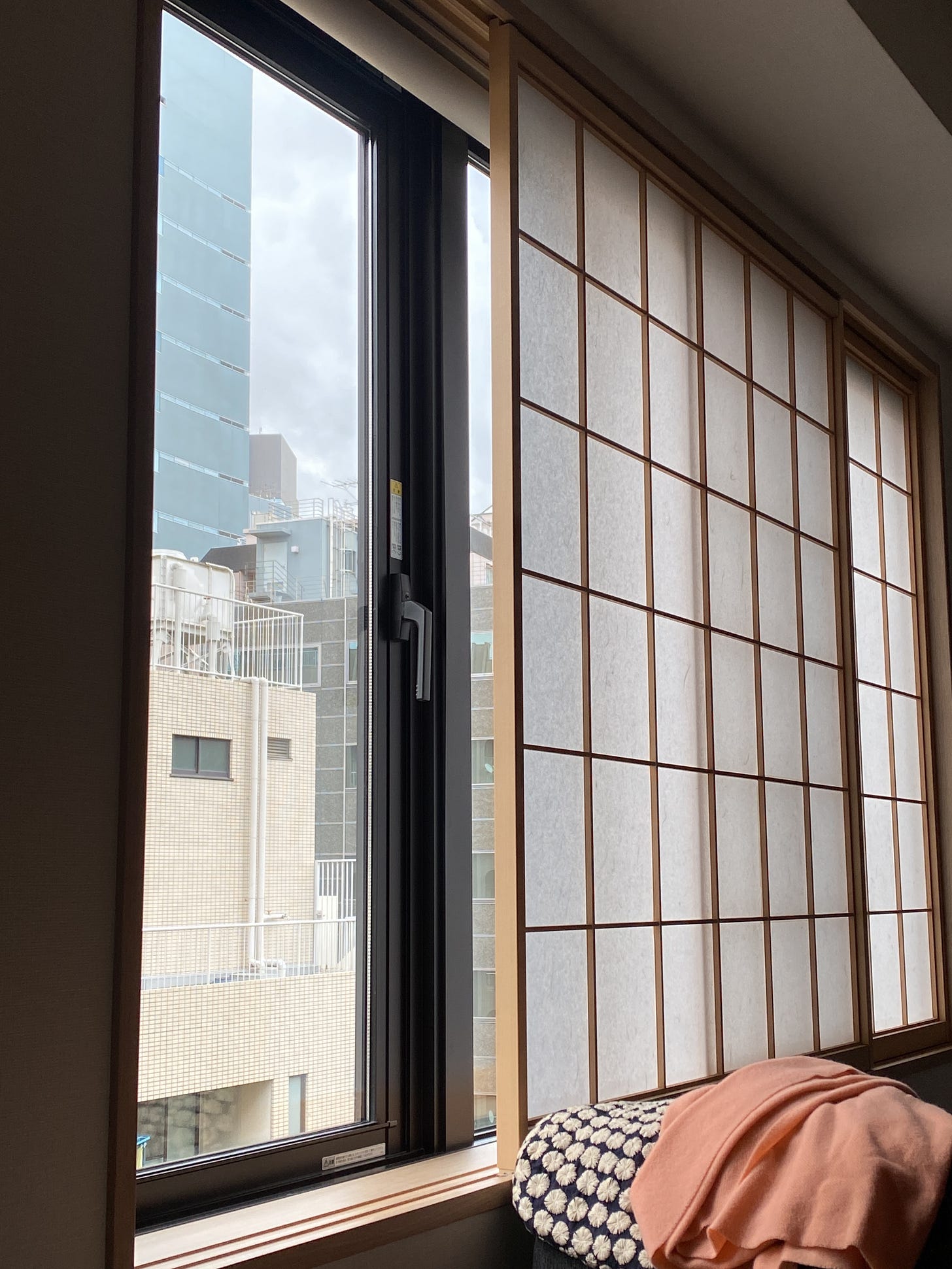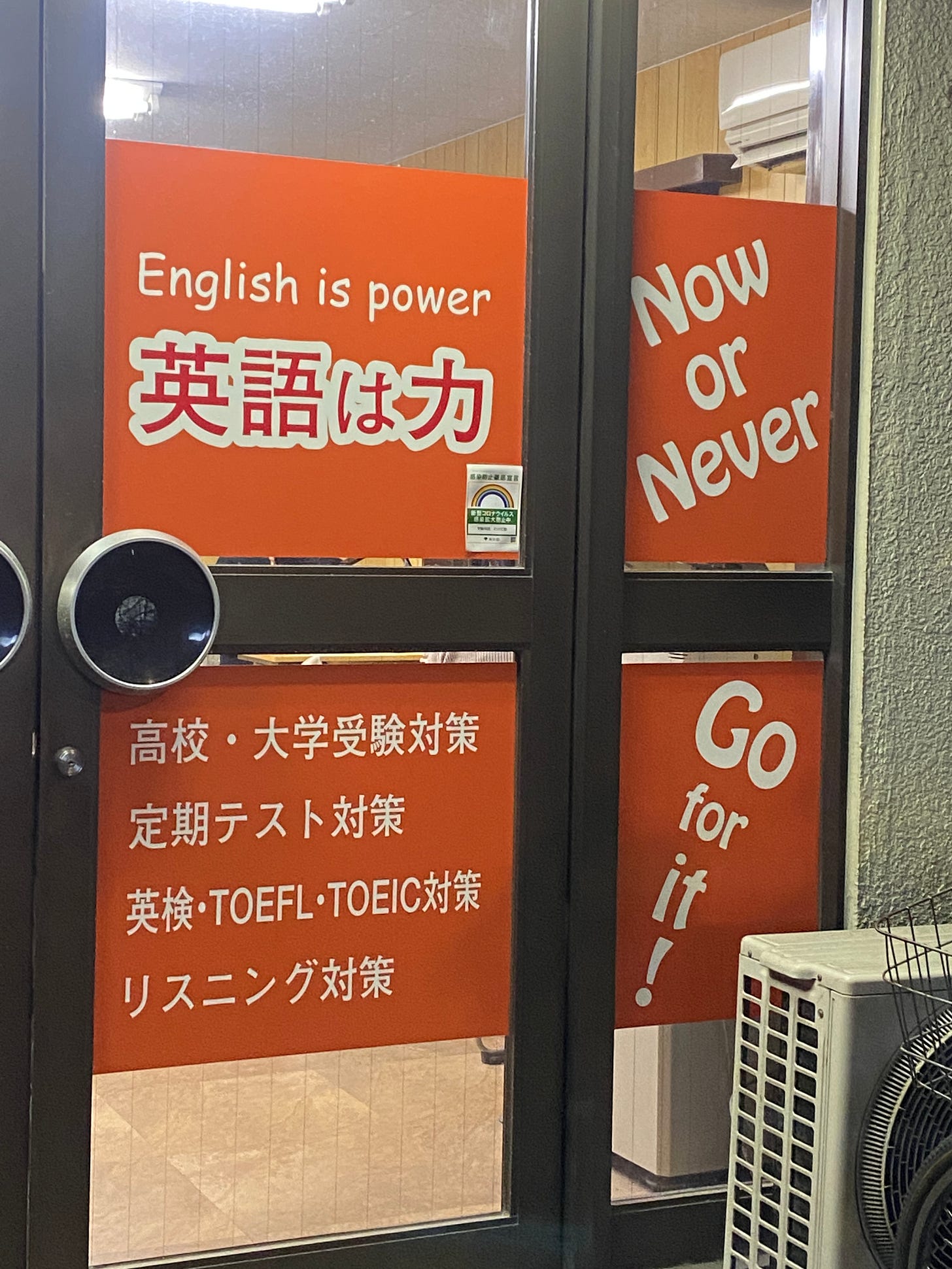chuo-ku
The future is a city away. - From “Fog” by Vincenz Serrano
Tokyo is one hour ahead. Night falls by 5:00 p.m. Back home, I imagine the sun has only just begun to set. Along my walk back to the hotel, I notice some of the trees have started turning, signaling the start of fall. Here, the weather is fair. No news of calamity or tropical depression on the horizon. In the middle of Nihombashi, a main avenue, there are barely any cars. A woman leisurely bikes past without a helmet. I wonder idly – guiltily – what it’d be like to have been born elsewhere.
.
The only Japanese words I know by heart are apologies and expressions of gratitude. Sumimasen, gomenasai, and gochisousamadeshita. Numbers I can swing. Asking for a table for three (3人), the cost of sweet potatoes (500円), and asking the taxi driver to take me to 4-1-1 Miyoshi, Koto-ku. Tokyo is context clues, but sometimes shopkeepers resort to English to save me the effort. “Jūsō ga arimasu ka?” I ask. “Try Daiso,” the 7-11 lady replied kindly. The taxi driver told me to just keep my coins when I got off half a block away from where I was supposed to be. Honto ni? Hai. Gomenasai. Arigatou Gozaimashita.
.
Even the birds are polite. Somewhat. A crow hovered a little closer while I finished my pastry on a Yoyogi Park bench. It had the decency to descend the moment I was at least three steps away, searching for leftover crumbs and puff pastry that had fallen out of my mouth in laughter. In Tokyo, nobody laughs too loudly. Not the kind I’m used to anyway. The ungainly kind. Laughs full of joy and air, loud enough for passersby to hear. Sometimes Tokyo can be so quiet for a city filled wall to wall with people. Everyone moving in an endless slipstream, as if in step with one another. You can’t help but wonder what would happen if just one person decided to stand still.
.
The Earth tilts on its axis at around 23.5 degrees. Around this time of year, a few months past the Equinox, the Northern Hemisphere tilts even further away from the sun. The sun rises low and the nights are long. 8:00 a.m. still looks like 6:00 a.m. It’s for this reason that other countries have four seasons and on the other hand, the closer you get to the equator the amount of sunshine stays the same. The same weather all year around.
On our first day, I stepped out early to get a feel of our neighborhood. In a coffee shop along Hamacho, the barista asks us where we’re from. The Philippines, we say. フィリピン. Firipin. He tells us his name is Bruno and that he lived in the Philippines for a while. “To learn English,” he says. And for a time he lived in Baguio. “Kind of like Japan,” he says. “Very chill.” I tell him our hotel is nearby and we’ll probably see him again. On our last day, when I visited for my last morning coffee, he wasn’t around.
.
“Wow, your English is very good,” said the bearded guy from California.
“Are you from Manila? My wife is from Manila,” said the guy from New York.
“Filipinos learn English at a young age, no?” Chef Oshima asked in broken English in the middle of dinner service. Yes, we say. “High school?” he asks. “Sometimes much younger,” I reply.
“Over here, nobody cared if I had a background in finance,” said L over a beer. He moved to Japan in 2018, leaving behind his job at a major Philippine bank. “But I could speak English and everyone thought that the was the most useful skill I had.”
"So you mean to tell me that people really want to learn how to speak English, still?” I ask.
“Of course. It’s pretty much the only way you can climb the corporate ladder in Tokyo, which is pretty much set in stone. You start out as a “salary man” or a clerk, and then eventually you become director or some head of a region. You only ever really get promoted once you can start talking to foreign clients, most of which are English speakers.”
“Is that the same for women?”
“Not at all,” replied R, L’s wife. R was born in Osaka, educated in Tokyo, and moved to the Philippines where she worked as a journalist for six years. She tells me she loves Manila because it reminds her of Osaka. Tokyo is a place for work, but it isn’t home. Much too fast. People are cold. She tells me about the female equivalent of ‘salary man.’ オーエル — OL or office lady. It often refers to female secretaries, which was often the ceiling for women in corporate careers.
“Women don’t have equal opportunities here,” she stated plainly. “Which is why Manila felt more accommodating. I actually felt safe. Okay, maybe not in terms of crime, but as a woman, I actually felt valued. That kind of safe.”
.
“When you live poor in Tokyo, you learn how to save where you can,” said N as she walked us to our station. N is Vietnamese and moved to Japan ten years ago because she dreamt of reading “One Piece” in Japanese. She still can’t, she tells me. But she can order me anything I want from a menu without pictures.
Don’t switch trains, most especially if they’re not run by the same company. Walking is fine. It’s a damn great city for walking. Cabs are for people with thousands of yen to spare. Isn’t it strange how the driver is on the right side? “It makes me dizzy,” I reply. Right. No cars. No traffic. “Not at all like back home,” said R, adjusting his backpack. R met N on Bumble a few years ago and now they’re engaged. They’re getting married in an events place in Quezon City sometime next year.
Home. “So the Philippines is still home for you?” I ask. “Oh for sure. Even if the opportunity is there for me to switch citizenship anytime, I don’t think I will,” R replies. “Why is that?” I ask.
“It’s because no matter what you do, you’ll never be Japanese. It’s different in the United States, where there’s actual diversity. Here? Too homogenous. They can smell you from a mile away. An outsider.”
.
Try to imagine this: You and I, walking the side streets of Chuo-Ko at 9:00 p.m. The streets are quiet, save for the chirping pedestrian lights and the occasional laughter of redfaced salary men on their way to the next Izakaya or to catch the trains before they close. We’re just another pair of bodies crossing the street to get to point B. Maybe that’s what I like best about Tokyo. All the wandering into, around, and within a city that doesn’t feel quite real. But even then, everything is a train ride away. The shore along Kamakura, the Skytree, the airport, the corner café. It’s everywhere and nowhere. For a few glorious days, you’re nobody. No gentle follow-ups or urgent messages. It’s a damn good city for walking so you walk. After living in isolation for so long, in a city where there’s nowhere to go, that’s everything.





